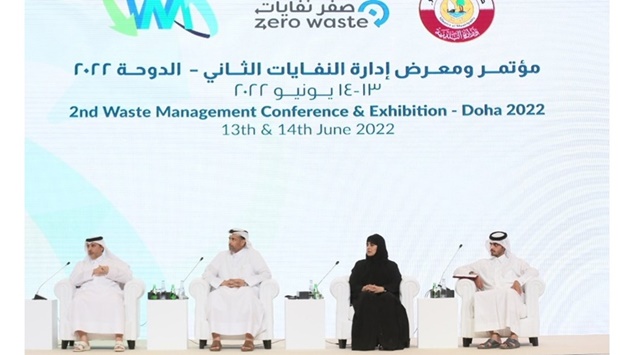HE the Minister of Municipality Dr Abdullah bin Abdulaziz bin Turki al-Subaie has stressed the importance of involving the private sector in waste management and recycling projects.
In a speech during a panel discussion at the Second Waste Management Conference and Exhibition, he said that his ministry is counting on raising awareness and involving all stakeholders through the Integrated National Solid Waste Management Programme, and is relying on the private sector to help achieve the strategic objectives for the growth of the circular economy in Qatar.
The discussion featured HE Dr al-Subaie, HE the Minister of Environment and Climate Change Sheikh Dr Faleh bin Nasser bin Ahmed bin Ali al-Thani, Qatar University vice-president for Research and Graduate Studies Dr Maryam al-Ali al-Maadeed, and Sheikh Ahmed bin Nawaf bin Mubarak al-Thani, the acting chairman of Suhail Industrial Group Holding.
The minister also revealed an experiment to provide an opportunity for private sector companies by assigning them cleaning operations in three municipalities in the country, including investing in equipment and personnel for a period ranging from 5-7 years. HE Dr al-Subaie added that if the experiment is successful, it would be expanded to cover all the municipalities in the country.
He added that the operations of the transfer stations (transfer and management) have also been fully assigned to the private sector, allowing the ministry to rely more on this sector. In this regard, the minister referred to a new plant to treat more than 2,000 tonnes of waste to generate power, which will be offered to the private sector during the coming years.
Old landfills will be rehabilitated and offered to the private sector in the future, with land allocated to factories to encourage them to develop the field of recycling.
HE Dr al-Subaie revealed that there are new proposed projects, the most important of which is the new engineered landfill, designed with a high level of safety, in addition to assigning cleaning operations to the private sector, converting waste to energy, and establishing waste sorting stations.
He added that in the field of legislation, plastic bags are banned, legislating sorting at the source, and recycling of construction waste in co-operation with a number of concerned authorities.
The conference concluded Tuesday.

